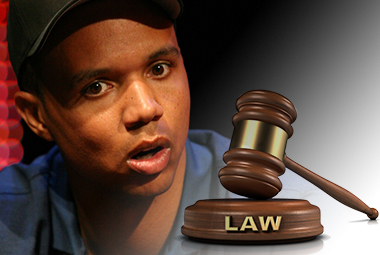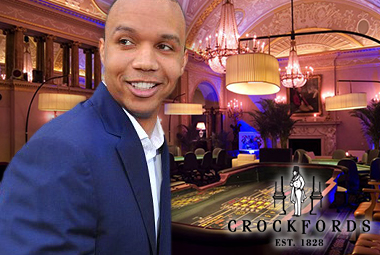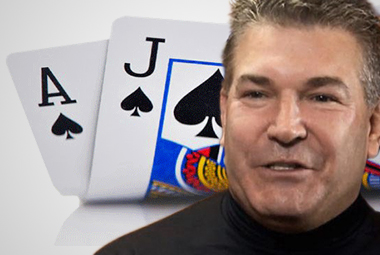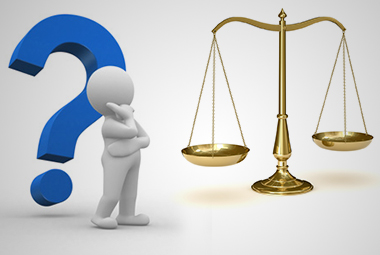The Edge-Sorting Case Continues

The Phil Ivey edge-sorting case against Crockfords Casino London is not quite over just that as the United Kingdom Supreme Court has agreed to hear Ivey’s case. This case is somewhat similar to a case that Ivey has going against the Borgata Casino in Atlantic City and is based upon the same subject matter. The major difference between the two cases is that Borgata paid Ivey his winnings whereas Crockfords Casino London did not.
Essentially, Phil Ivey is the Plaintiff in the Crockfords case because he is suing to try to get the money that he won from the casino (who refused to pay him) and he was the Defendant in the Borgata case as they were suing to, ‘Recover,’ their money. In the case of Crockfords, Ivey won nearly eight million pounds (7.8 million) using a combination of edge-sorting and favorable terms that he negotiated with the casino to make the task of edge sorting even easier.
Eliot Jacobson, Ph.D., of APHeat.net gives an excellent breakdown of exactly what edge-sorting consists of in this Youtube video.
In order to make it obvious to a new viewer how edge-sorting works, Jacobson uses an extremely poor deck of cards in his initial example, which is clear because one side of the cards only has a half diamond running down it whereas the other side has a full diamond pattern running down.
The goal of the edge-sorter is to try to align the cards in such a fashion as to be identifiable the next time they come out of the automatic shuffling machine. In other words, the edge sorter might want to attempt to get as many cards as possible of a particular rank to have the half diamonds on the side (as they come out of the shuffling machine) while the other cards would show full diamonds on the side that comes out.
Edge sorting works in games such as Blackjack and Baccarat because the rank of the first card out is extremely important in those games, and the player who knows what that rank is and bets accordingly (or, in the case of Baccarat, selects either Player or Banker) is at a serious advantage. When it comes to both of these games, edge-sorting is typically the most effective when guys are playing as a team (though they don’t necessarily have to be) because it gives the players the ability to, “Turn,” as many of the desired cards as quickly as possible in a game such as Blackjack in which the players get to touch the cards. When operating as a team, usually the player sitting at, “First Base,” (in the case of Blackjack) will be the big bettor who is either going to make a substantial bet, or a small one, depending on what the first card out should be. In the case of Blackjack, the goal would be to identify tens and Aces ahead of time.

When it comes to Baccarat, the player sitting at first base (or close) might have the best line of sight on the edge of the card, so the other players might follow that player’s lead in terms of betting. While it is pretty clear how edge-sorting can offer a savvy player with keen sight a substantial advantage, Borgata and Crockfords unwittingly helped Phil Ivey beat them!
In general terms, Phil Ivey made four requests that were very important to his edge-sorting scheme, but it all started with the casinos being willing to acquiesce to his requests to begin with. Ivey accomplished that by wiring one million pounds (upfront) to Crockfords Casino London and three million dollars (American) to Borgata in Atlantic City. In addition to the upfront money, Ivey likely promised the casinos that he would maintain a certain level of play and play for a minimum amount of time, which he was more than happy to do given the advantage of, “About five percent,” that he claimed to have in a 60 Minutes episode.
In order for Ivey to play at the casino, he demanded (and was permitted) four major concessions that were integral to his plan. Here is what he requested and why:
The Big Four
1.) A specific type of playing card.
-This is really simple, the cards being used had to be edge-sortable to begin with, and it can be presumed that Ivey selected a type of playing card that was not only sortable, but also, that the difference in the edges was easily identifiable to himself, his partner, Cheng Yin Sun, or both.
2.) That the same decks of cards be used throughout his entire trip.
-The reason for this is simply so that the cards would remain sorted throughout all of his play there. In other words, if he and his partner were to leave the table and then come back, there wouldn’t be completely new cards in play that would need to be sorted all over again. Essentially, Ivey and his partner only had to play through the decks at a disadvantage once to eventually turn the tables and be playing at an advantage.
3.) A Mandarin-speaking dealer.
-Ivey’s partner in all of this was Mandarin-speaking Cheng Yin Sun, so Ivey wanted a dealer who also spoke Mandarin so that Yin Sun could communicate with the dealer in order to request that the dealer turn the cards in such a fashion that enabled the edge-sorting to begin with. The beauty of this was that nobody else present would understand what was being said, so they wouldn’t understand what was going on or why it was happening.
4.) An automatic shuffling machine.
-In this case, Phil Ivey requested that the casino use an automatic shuffling machine out of which the cards would be dealt in the game. The reason for this is because the automatic shuffling machine has no mechanism by which to, “Turn,” the cards, so any cards that have been edge-sorted to the extent that the ranks would be identifiable will remain that way even though they are shuffled.
-It was also important to ensure that the dealer did not, “Turn,” the cards prior to placing them in the shuffling machine, as a simple turn of half of the cards would throw off the edge-sorting completely. It is difficult to say whether or not turning the cards would have otherwise been part of each dealer’s normal procedure, but if so, Yin Sun probably requested that the dealer not turn the cards before placing them back in the automatic shuffler.

The Results
The result at Crockfords Casino is that Phil Ivey won roughly 7.8 million pounds that the casino refused to pay him, so Ivey sued to collect those monies. In the lower court, Ivey’s lawsuit was unsuccessful, and his appeal attempt to the next level Appellate Court also failed 2-1. It is from that appeal that Ivey sought leave to appeal to the highest Court of Appeals (the U.K. Supreme Court) and leave was granted, which means the Supreme Court will hear the case.
That’s actually a pretty major development because, much like the U.S. Supreme Court, a Plaintiff or Defendant does not necessarily have what is known as an, “Appeal-of-Right.” An, “Appeal-of-Right,” simply means that a Court of Appeals has no choice but to hear your appeal simply because you are appealing. Most appeals that stem from lower courts to the first Court of Appeals above said lower courts are, “Appeals-of-Right,” the Court of Appeals literally cannot refuse to accept a Brief of Appellant.
Supreme Courts (both in the U.K. and U.S.) are totally different, not only can Supreme Courts decide that they don’t have subject matter jurisdiction, (which often comes about if no matter of national law can be invoked, and theoretically, in the U.S. Supreme Court, they would not have subject matter jurisdiction unless there was some sort of Constitutional question...theoretically) but even if they do have subject matter jurisdiction, they can simply choose not to accept that case. Naturally, that is done more out of necessity than anything simply because you couldn’t have every single lawsuit in the entire country eventually making its way to the Supreme Court.
In the case of Crockfords, Crockfords has asserted that they refused to pay Ivey the money, and were not in the wrong in doing so, because Phil Ivey cheated. The same general allegation is being made in the Borgata case in which the casino sought to recover the money that Ivey had won (and been paid) as a result of the same general edge-sorting tactic.
Should This Have Happened to the Casinos?
A casino protection expert said it best in the 60 Minutes episode when he said that there is essentially no way in Hell he would let Ivey play anything in his casino, presumably, with an exception to poker. That guy has it 100% right.
If there is one thing that poker and baccarat have in common it is the fact that they are both gambling games, so when one of the greatest poker players in the history of the world is eager to play any sort of gambling game at your casino, you can probably bet your sweet ass that he is going to be at some sort of advantage. The nice thing about making that bet, of course, is that you won’t be losing your ass!
Personally, I do not look at what Ivey did as cheating, but even if you do, there can be absolutely no escaping the fact that the casinos put themselves in that position in the first place. The casinos made a number of concessions to an extremely well-known professional gambler who has made his fortune, primarily, by playing poker and simply assumed that those concessions would not result in Ivey having any edge in his favor.

For those of you who want to look up, “Don Johnson Blackjack,” on a Google search and read about that, it mostly consists of a player who beat up several Atlantic City casinos because he was offered a loss rebate such that he was at a significant advantage at Blackjack. He may have even been using other tactics in correlation with the loss rebate, but I believe that he denies that, or did deny it at one time.
The point of the matter is, when players start requesting changes to the normal procedures of a game, specific decks of cards and special dealers, any astute casino is going to at least ask, “Why?” If the casino does decide to ask that, and does a little bit of research, then they might come to understand why a player would want those types of concessions. While edge-sorting is not one of the most common forms of advantage play, Ivey was far from breaking new ground by employing it, though the concessions that he got from the casino were owing to his substantial bankroll, the fact that he fronted money and his reputation.
It is that very reputation, I argue, which is why the casino should not have granted him those kinds of concessions to begin with! The guy is a professional gambler! What possible reason is there to believe that he is going to play a game of any kind with serious money at a disadvantage? Like I said before, I tend to agree with the casino expert interviewed on 60 Minutes which is to say that I wouldn’t allow Ivey to play anything except poker in my casino, much less encourage him. The casino protection expert even went as far as to say he wouldn’t let Ivey touch a slot machine in his casino.
Did Phil Ivey Cheat?
Cliff Notes version:
HELL NO!!!
Long Version:
Phil Ivey didn’t cheat because he did absolutely nothing (personally) to change the conditions of the game in any way whatsoever, and even if he had, (as edge sorters in certain games must) it would still be on the casino for failing to protect their game properly. If the dealer had simply turned half of the cards before placing the stack back in the shuffler, that and that alone would be enough to foil Ivey’s entire plan and (barring some other mechanism, like a loss rebate) would be enough to eliminate Ivey’s entire advantage.
The long story short is that Phil Ivey did not cheat, the casino knowingly and deliberately changed its rules and procedures in a fashion that not only enabled Ivey to win, but enabled him to do it relatively easily. When playing a low variance game at a 5% advantage, it’s really not going to require too many trials for a player to end up on the positive side of things. For instance, imagine a Heads/Tails coin flip game in which the player gets $0.55 every time his side wins but loses only $0.50 when his side loses, (5% advantage) even if the player, “Runs bad,” it’s not going to take too long for mathematical expectation to sort itself out enough that the player eventually ends up ahead.
The fact of the matter is that Phil Ivey not only won substantial sums of money from Borgata and Crockfords, but he humiliated and embarrassed them in the process. They are continuing to be humiliated and embarrassed to this day, even if they ultimately prevail in their appeals, because Phil Ivey went in there and gave them a multi-million dollar black eye and they either ran crying to the court system (Borgata) or refused to pay him (Crockfords).
Why Did the Casinos Cater to Ivey?
In an ironic twist, the casinos catered to Ivey for no reason other than they thought they were going to have a sucker on their hands, they wanted to win his money and they probably also wanted whatever acclaim they would get from being able to say that Phil Ivey played there.
The fact of the matter is that the casinos believed that Ivey went in there to knowingly play a negative expectation game for large amounts, the casino believed they had an advantage over him and basically thought he was going in there as a sucker hoping to get lucky. What they didn’t expect was that they were the ones getting suckered, which only adds to their humiliation.
The fact of the matter is that the casinos should be wary of anyone who wants to make special conditions in order to play their games, but this is especially true when it comes to extremely well-known advantage players, which poker professionals certainly are. Interestingly enough, smaller-time players (the kind who couldn’t individually do any serious damage to the casino) would be lucky to get any kind of loss rebate unless there was one being offered, in general.

Conclusion
One can hope that other casinos have followed this case closely and have learned something from everything that has happened and all that has been brought to public light via court records. This is not, of course, the first time that there has been a documented record of a casino being burned by a highly bankrolled player to whom they have offered special concessions, and it probably won’t be the last. On a smaller scale, this type of incident has likely happened several other times and the casinos either did not realize it or it was not brought to public light.
The one lesson that big time players should learn, and perhaps even players who are not on Ivey’s level, is that there are at least two casinos out there who are not afraid to use the court system to try to retrieve a player’s winnings from him, or alternatively, who are willing to completely outright refuse to play a winning player with a specious allegation of, “Cheating.”
The most alarming aspect of all of this is that there are apparently lower courts out there who are willing to decide that a player has cheated even if the actions of a player do not meet any reasonable definition of, “Cheating,” and no gambling expert anywhere would arrive at the conclusion that the player has cheated. We have also learned that, even if a casino shoots itself in the foot, that there are going to be judges out there who will side with the casino because they do not either have the time or inclination to come to a full understanding of what exactly a player did and why it was NOT cheating.
In terms of smaller-level players, I think that there are some positives and negatives as a result of the Crockford and Borgata incidences.
The biggest negative is that it has resulted in the concept of, “Edge-Sorting,” to come to be known to an even wider audience, including those on the casino side of the industry, and as a result, one must assume that there are casinos that are now taking stronger measures against it that they had previously not been doing.
The only positive for other players that I can see is that, if Phil Ivey ultimately wins, then there will be strong legal precedent that edge-sorting absolutely does not constitute cheating thereby resulting in any future cases (if there are any) hopefully being resolved more expediently. In the meantime, however, the mass exposure of the concept of edge-sorting has almost definitely hurt smaller time advantage players in terms of game availability.
Another negative is the fact that casinos may now know to take a closer look at any concessions that bigger players want to be offered in order to try to figure out any potential, “Angles,” that a player may be working.
There can also be no doubt that Phil Ivey and Cheng Yin Sun shot an, “Angle,” on both Crockfords and Borgata, they utterly conned the casino into playing right into their hands. (I’m not using, ‘Conned,’ in any type of legal sense) The two partners in this scheme laid a trap that the casino walked directly into, and it worked beautifully, except for the getting paid and keeping the money part. Whatever the result there is one thing the two definitely did not do, and that is cheat.
Comments
Mission,
Well done. My only comment calls attention to (IMHO) a significant omission on your part.
Your section, "SHOULD THIS HAVE HAPPENED TO THE CASINOS," missed the opportunity to note that "edge sorting" was referenced in publications prior to 1900. And, edge sorting as an "advantage" gaming technique has been a staple in professional gaming books since the 1970s. Crockford's (and Borgata's) failure to recognize this advantage play demonstrates incompetence on the part of casino management.
If the casinos were aware of advantage play by edge sorting (i.e., the casinos were not "incompetent"), then it suggests the casinos allowed Ivey's baccarat play because they saw it as a win-win for them. If the casino ends up ahead, so be it. If Ivey ends up ahead, the casino doesn't pay Ivey's winnings because he "cheated." If this were to be the case, it appears to me the casino(s) engaged in a conspiracy of criminal proportions.
LuckyPhow,
Thanks for the compliment, first and foremost!
That is an excellent point about the missed opportunity to point out how long edge-sorting has both been known, in general, as well as known to be a viable way to gain an advantage. I've always kind of thought of it as, "Marking without marking." They're already marked, in a sense, you just have to get them oriented the right way.
I also agree with your last paragraph and think that is a (very) outside possibility as relates Crockfords. I wouldn't be willing to go quite that far on Borgata because Borgata paid him initially and sued for the recovery of the money. While one could say, "Theoretically, Borgata may have always intended to get their money back," I think someone could say that, but believing it would take a bit of a leap. The fact that Crockfords never paid Ivey to begin with, putting Ivey in the unenviable position of Plaintiff, does raise my suspicions as to the possibility of having it planned all along a little bit more...but still not very much.



